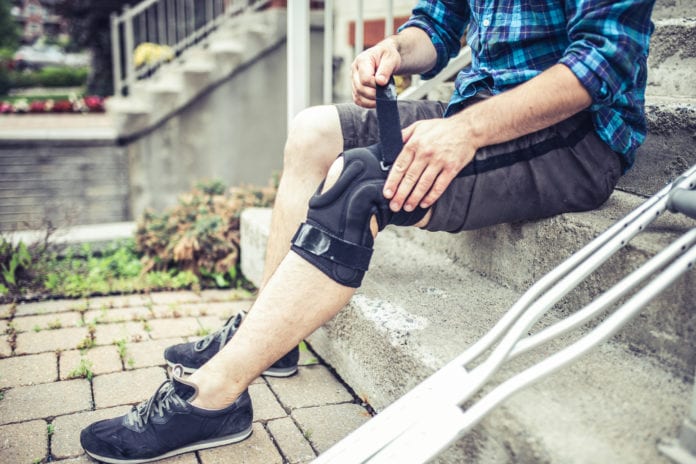Wishing They’d Had It Sooner
It begins with groin, thigh or knee pain while walking up a flight of stairs, or getting up from a low seat, or stepping into a volley on the tennis court. Suddenly an everyday activity can’t be done without feeling pain, typically because arthritis has worn away the cushion inside the joint. Eventually the pain can begin to interfere with sleep, or prevent people from playing with children or grandchildren, and the patient ends up in the office of an orthopedist who specializes in hip and knee replacements — like Dr. Premkumar.
Joint replacement isn’t an initial treatment option — doctors will generally first try anti-inflammatory medications, exercises, bracing or even injections designed to help reduce inflammation around the joint.
“These are all intended to relieve pain and improve function from the pain, but none of these measures change the underlying problem, which is loss of the cartilage, the cushion in a joint that allows for pain-free motion” Dr. Premkumar says. “So when arthritis symptoms become so severe that they interfere with quality of life on a daily basis, and the non-operative things aren’t providing much relief, that’s when we talk about surgery.”
 For patients who deal with pain and diminished function from hip arthritis, hip replacement surgery not only relieves pain, but also improves range of motion, which is often lost due to arthritis. At the Emory Orthopaedics & Spine Center, specialists like Dr. Premkumar perform hip replacement and resurfacing surgery through multiple approaches, including the anterior and posterior approach, and this allows them to personalize treatment options for an individual patient, whether it’s a 45-year-old runner, a 55-year-old yoga instructor or a 65-year-old former athlete who would like to stay active.
For patients who deal with pain and diminished function from hip arthritis, hip replacement surgery not only relieves pain, but also improves range of motion, which is often lost due to arthritis. At the Emory Orthopaedics & Spine Center, specialists like Dr. Premkumar perform hip replacement and resurfacing surgery through multiple approaches, including the anterior and posterior approach, and this allows them to personalize treatment options for an individual patient, whether it’s a 45-year-old runner, a 55-year-old yoga instructor or a 65-year-old former athlete who would like to stay active.
About 95% or more of Emory hip replacement patients go home on the same day of surgery. They have the surgery in the morning, and they’re in their own bed that night. There may be some soreness and numbness in the surgical region for the first few weeks, and usually by 4 to 6 weeks patients are beginning to walk very well, and by three months are usually back to most of their desired activities.
It’s a similar journey for those who undergo knee replacement. The specific type of knee replacement surgery a patient receives depends on the pattern of their arthritis — whether it’s affecting the inside or outside of the knee, between the tibia and femur, or underneath the kneecap. If two or all three of those areas are impacted, a total knee replacement may be recommended, in which case the entire surface of the knee joint is exchanged for a metal and plastic substitute. If just one area is affected, the conversation turns to a partial knee replacement, where the bone surface of just the impacted part of the knee is replaced. In either case, the precision of the procedure at Emory Healthcare is enhanced by use of the latest surgical techniques and computer assistance and robotics.
Dedicated Campus of Professionals
The first and only dedicated hospital for orthopedic specialty care in the region, Emory University Orthopaedics & Spine Hospital performs thousands of hip and knee replacements each year, with almost all patients going home and sleeping in their own bed on the same day as the procedure.
 “If you are considering a joint replacement, you want to go to a hospital that does a high volume of this procedure,” Dr. Premkumar says. “There is evidence and data that suggest that higher-volume surgeons and higher-volume hospitals have much better outcomes when it comes to joint replacement surgery.”
“If you are considering a joint replacement, you want to go to a hospital that does a high volume of this procedure,” Dr. Premkumar says. “There is evidence and data that suggest that higher-volume surgeons and higher-volume hospitals have much better outcomes when it comes to joint replacement surgery.”
Consistently ranked among the top orthopedic and spine programs in the nation, Emory Healthcare also offers routine orthopedic and spine care, advice on surgical options, and second opinions on potential surgeries. The Emory University Orthopaedics & Spine Hospital has its own campus with a dedicated staff of physicians, anesthesiologists, nurses and therapists who are completely focused on knee or hip replacement surgery and recovery.
Patients can make an appointment with the Emory Orthopaedics & Spine Center at locations across metro Atlanta—from Spivey Station to Flowery Branch—where they will be provided with a plan that cares for their individual needs. As many of Dr. Premkumar’s patients can testify, a consultation with the joint replacement experts at Emory can be the first step toward returning to an active and pain-free life.
*Results based on an average of 86% patient satisfaction rating compared to a national benchmark of similar facilities at 68%. Infection rate average at .45% for primary hip and knee procedures compared to .58% nationally.
 “While historically we would estimate joint replacements to last roughly 20 years,” he adds, “as technology and materials are constantly improving, we hope the modern joint replacements we are putting in today will last even longer.”
“While historically we would estimate joint replacements to last roughly 20 years,” he adds, “as technology and materials are constantly improving, we hope the modern joint replacements we are putting in today will last even longer.”

 For patients who deal with pain and diminished function from hip arthritis, hip replacement surgery not only relieves pain, but also improves range of motion, which is often lost due to arthritis. At the
For patients who deal with pain and diminished function from hip arthritis, hip replacement surgery not only relieves pain, but also improves range of motion, which is often lost due to arthritis. At the  “If you are considering a joint replacement, you want to go to a hospital that does a high volume of this procedure,” Dr. Premkumar says. “There is evidence and data that suggest that higher-volume surgeons and higher-volume hospitals have much better outcomes when it comes to joint replacement surgery.”
“If you are considering a joint replacement, you want to go to a hospital that does a high volume of this procedure,” Dr. Premkumar says. “There is evidence and data that suggest that higher-volume surgeons and higher-volume hospitals have much better outcomes when it comes to joint replacement surgery.”

